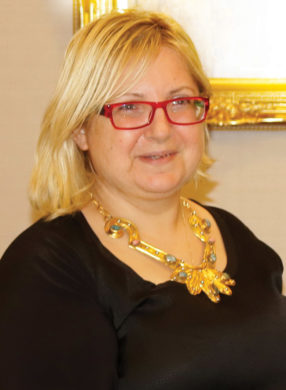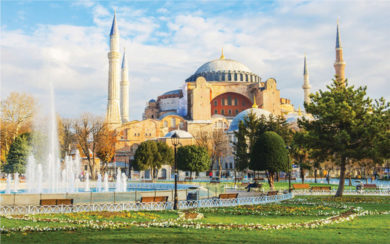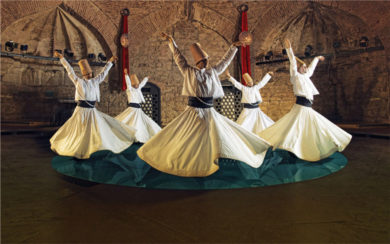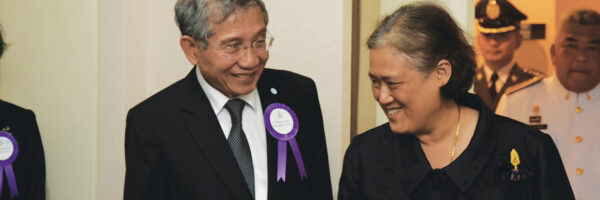
Appreciating the gift of life – everyday

Cancer is a scary word. And the disease itself is truly scary. Creeping up on one, often at a time when least expected. A diagnosis, for instance, comes when life is already full of its challenges – and you just do not need one more problem.
Or it may come when everything is going well in your life, so much so that you feel happy, strong, almost invincible, on top of the world!

Either way, cancer strikes when you are way too busy to take a moment to listen to your body and almost certainly as you are taking your health for granted.
So, when cancer hits a person, or a loved one, it is the ultimate desperate realisation of one’s finiteness. That you or they may no longer live to see next spring, summer or that a father, mother, son, daughter may no longer be. It is a harsh face off with one’s existence – and our place in the world.
Cancer is never just a physical ailment, but a rollercoaster of many emotions, often too complicated for all those affected to fully grasp. Above all, cancer is mostly about self-discovery. It can also make one realise one’s potential as a fighter.
It is a journey – albeit one, I hope no one has ever to embark on. But if one day you or a loved one has to go through this journey, it is important to know and accept at the outset that it can indeed be a tough upstream journey. I have had one too many experiences in this regard. Knowing and accepting that it is a difficult journey is important because then it becomes easier to not give up at the first hurdle. The treatment process can be lengthy and may not always go uphill. Different protocols may have to be tried, progress may reverse and then pick up again. The important point is to be prepared for a rough ride and persevere.
This journey sometimes begins with an early detection – but often not. Either way, access to good medical care, from beginning to end is a trump card. It is the first pillar in a sound structure to fight the fight to the end, to a happy one. A good support system beginning in the family, amongst friends, in society and through public and private means is the next important pillar. Then there is the much acclaimed morale aspect. It can be half the journey. But while it is very important to keep up your morale, my personal experience with cancer in my family has sadly shown me that beyond a certain point, morale alone just cannot swing the odds. Good medical care is absolutely necessary.
The real trick in fighting a victorious battle however, is to actually never fall prey to cancer. If at all, this is only possible by prevention. Here, and I can speak from personal experience, it is extremely important to know your family background at least two generations back and do a bit of research also horizontally in the family tree. Going back to discovering the health issues faced by great grandparents is golden, but do not underestimate the significance of what grabs your cousins for instance.
Family history in health is a valuable and worthwhile puzzle to work out. It is the first step in determining where to look for the traps! Advances in genetics will surely continue ushering in huge advantages in this respect, but until they are widely available at affordable rates, you may still need to work out part of the puzzle based on your own family clues.
If prevention is not possible, then early detection is your best bet. Then come good medical services, efficient post-op care where applicable, and treatment. Good nutrition can help tremendously too. So can meditation, spiritual and religious belief. To instil confidence or to seek acceptance …
Once a survivor, the patient has to face, often as a lifetime challenge the prevention of cancer from recurring. And that brings us back to the beginning of the whole cycle. This is also the point where a switch to lifelong healthy habits, from eating to exercise should be taken up, in line with improvements in the general health condition of the patient.
Cancer is one of the major causes of death in Turkey. According to the latest available figures, every year 100,000 men and 70,000 women are diagnosed with cancer.
However, I am proud to say that Turkey today possesses all the necessary tools to take each of the steps of this cycle in a most efficient, reliable and successful manner.
Cancer is a problem of community health and it is getting more and more common across the world. Together with cardiovascular diseases, diabetes and chronic lung diseases, cancer is among the four leading causes of deaths due to non-communicable diseases, accounting for around 80% of total deaths worldwide. Around 14 million patients are diagnosed each year with cancer.
As grim as this picture is, statistics tell us that one third of this disease is preventable, with the other one third being treatable through early diagnosis.
In this context, we have given an exemplary struggle against tobacco and obesity as the building stone of cancer control. Turkey is declared to be a leader country and cited as an example by the World Health Organisation regarding the anti-tobacco struggle. I am happy to note that Thailand, too, has been quite an achiever in this regard too.

Turkey is among the few countries that has a National Action Plan on Cancer; has set up its Cancer Institute and begun the Cancer Genome Project, aimed at individual treatment for cancer patients.
Our efforts are not limited to the domestic agenda. Conscious that good health and healthcare form the basis of sound and functioning societies, and indeed that sustainability is contingent on healthy societies, we have been working to make sure that high quality in the health sector is not seen as a luxury but a necessity.
Health is one of the 17 Sustainable Development Goals as agreed by the international community in 2015.
Therefore, Turkey’s efforts in this sector also include the international domain. We organised on the margins of the 13th Islamic Summit Conference on 14 April 2016 in Istanbul, in coordination with Organisation of Islamic Cooperation (OIC) General Secretariat, a special session on First Ladies’ Leadership on Cancer Control. This session, in line with the decision of the 5th Islamic Conference of Health Ministers held in Istanbul in 2015, provided a platform to sensitise the political leadership of the member states on the increasing burden of cancer and to deliberate upon ways to expand access to effective prevention, diagnostics, treatment and care.
The special session aimed for the leadership of First Ladies to bring transformational changes and cross-national collaboration in the fight against cancer by drawing attention to increasing cancer cases in Africa, Asia, Central and Southern America, and to assess the opportunities for international cooperation and to raise social awareness about cancer. Turkey is the lead country of the thematic area of cooperation titled “Disease Prevention and Control” under one of the six sections of the OIC Strategic Health Programme of Action, and sees cancer as one of the most important diseases that needs to be fought in this respect.
Turkey is also contributing to global efforts to enable low and middle income countries to implement cancer control actions. The İzmir Cancer Registry, a Regional Hub for North Africa, Central and West Asia, in Izmir, on Turkey’s Aegean coast, is one of six hubs within the regional hub system of the International Agency for Research on Cancer (IARC), the cancer agency of the World Health Organisation (WHO), to provide expertise and support to registries worldwide. This initiative is described as an onsite assessment of the cancer registry needs in target countries in order to determine specific plans for areas of improvement.
The İzmir Hub provides the necessary support, training, advocacy, and research opportunities to cancer registries across 29 countries in North Africa and Central and West Asia, such as consultations, tailored education, and the fostering of research and networking capacity.
Turkey’s accumulated experiences in the field of medicine have led to a great synergy with another of its comparative advantages, namely tourism. The health sector is now driving the tourism sector and vice versa.
Rightly known as a favourite tourism destination with its natural beauties, modern resorts, diverse historical sites, cultural wealth and gastronomy, Turkey, the 6th largest economy in Europe, and the 6th most visited tourism destination in the world, is today also one of the most popular medical tourism destinations, with over 740 million medical tourists visiting in 2015, half a million last year and half a million in only the first half of 2017.
While Turkey is home to Asklepion (Pergamon), one of the earliest medical centres (2nd century AD) where treatments employed included psychotherapy, massage, herbal remedies, mud and spa treatments, with its modern healthcare infrastructure, today’s Turkey is among the top ten medical tourism destinations, up seven places from only five years before. In line with advances in adding state of the art technology to its top quality medical human resources capital, Turkey has been pushing upwards in providing quality healthcare within a cost-effective range in terms of comparable healthcare in many other countries.
In addition to oncology; surgical cardiology, ophthalmology, dentistry, plastic surgery, organ transplant, orthopaedics, in-vitro fertilisation and brain surgery are amongst the leading fields that attract patients to Turkey.
Turkey celebrates the 94th Republic Day this month. By 2023, when the Republic is 100 years old, Turkey’s goal in health tourism is to welcome two million visitors facilitated by the introduction of certain incentives in healthcare zones, specifically tailored for foreign patients.
Still, despite all national and international progress and no matter how well-developed or how high quality the medical infrastructure may be, the goal in fighting a winning battle against cancer should be prevention. Remember: prevent (healthy lifestyle, self-awareness, self-appreciation), detect (regular checkups), treat, follow up and keep your chin up!






